There is a small volume of Myanmar coffee on Algrano this year. Selling to new roasters allows producer groups to grow and strengthen their relationships with farmers, offering the support they wouldn’t get otherwise.

Given Myanmar’s current political isolation - and the fact that most foreigners haven’t been allowed in the country recently - it’s hard to get a full picture of what’s happening in the country.
>> Is it ethical to buy coffee from Myanmar? Here's what you need to know.
To get the latest news of the harvest and the full brief on new producers, our team spoke to U Sai Wan, Mandalay Coffee Group’s Sales Director, and Soe Thinzar, Shwe Taung Thu’s Quality Control Manager.
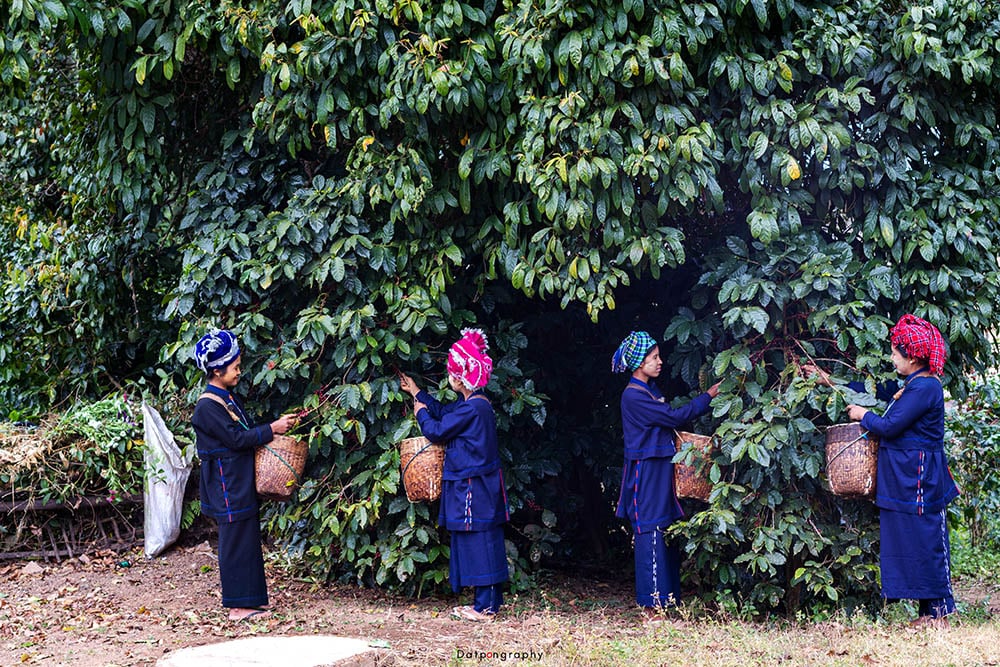
Myanmar’s specialty coffee sector is small. The producers who joined the project from Winrock International and the Coffee Quality Institute from 2015 to 2018 continue to lead the way and push the industry forward.
Two of these groups have coffee on Algrano this year for the first time:
Mandalay Coffee Group (MCG) is one of three processors that received grants to build modern wet and dry mills.
Shwe Taung Thu is one of two community-based producer associations that were formed to process and market Dry Naturals.
In this blog, you’ll get to know a bit more about these two groups and the people behind them. You’ll also get an overview of what’s happening in Myanmar right now.
Mandalay Coffee Group (MCG) - Pyin Oo Lwin Township, Mandalay District
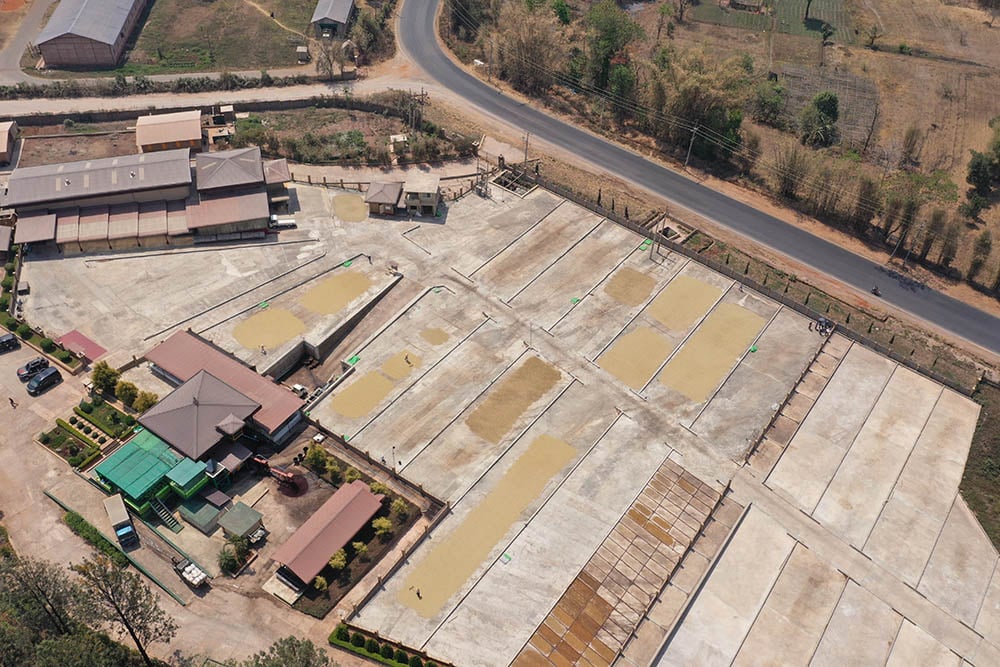
MCG was born in 2014 out of desperation. This is how the group’s Sales Director, U Sai Wan, explains it.
The price of coffee cherries crashed in 2013 and smallholders were cutting down their trees. Soon, there would be no coffee farmers left.
To stop that, the owners of larger farms in Mandalay decided to organise as a group. The idea was to create a centralised processing facility and combine efforts to find markets for their coffee and smallholder beans.
U Sai Wan says that “Before MCG, most estate owners produced coffee their own way. This was leading to inconsistent quality. We thought it would be better to build a centralised processing factory to have consistency".
At that time, only Thai and Chinese traders went to Myanmar to buy coffee. “Other people didn’t know Myanmar produced coffee. If people don’t know, they won’t come and buy it.”
Connecting the Industry and Raising Prices
But building a mill wasn’t the only solution the estate owners came up with. They also joined forces with community leaders and local roasters to form the Myanmar Coffee Association. And that’s when Winrock International and the CQI team arrived with the knowledge farmers needed.
>>How Coffee from Myanmar Got Amazing: The Making of an Origin.
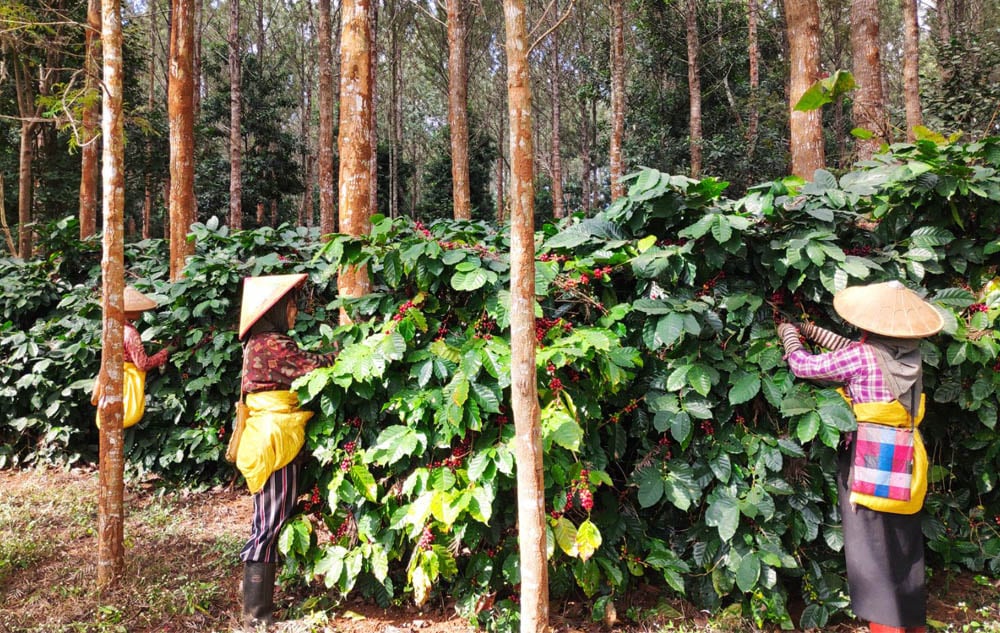
MCG was the first group to pay more for cherries in Myanmar. U Sai Wan says, “When we got established, the price was 350 Myanmar Kyats per viss [1 viss = 1.6kg of cherry]".
"We decided to buy cherries from farmers at 500 Kyats. Gradually, we increased this to 700 kyats, then 800… And when we got specialty buyers, we raised the price more and more.”
This means MCG was able to increase the cherry price from US$0.27/viss to US$0.38/viss straight away. And then to US$0.54/viss and later to US$0.62/viss as the quality improved.*
Today, MCG sells coffee from estates around Pyin Oo Lwin Township and around 30 smaller farms (between 5 and 50 acres) from a handful of villages in Mandalay.
They also collect cherries from smallholders in 15 to 20 villages in Shan State, especially around the townships of Ywangan and Pindaya.
MCG sends a buying agent to agree on the purchase with village leaders and takes the coffee back to the processing facility at Pyin Oo Lwin.
*The conversion rate is based on the exchange between Myanmar kyats and American dollars in December 2015 (1 USD = 1286.60 MMK).
Shwe Taung Thu - Ywangan, Shan State
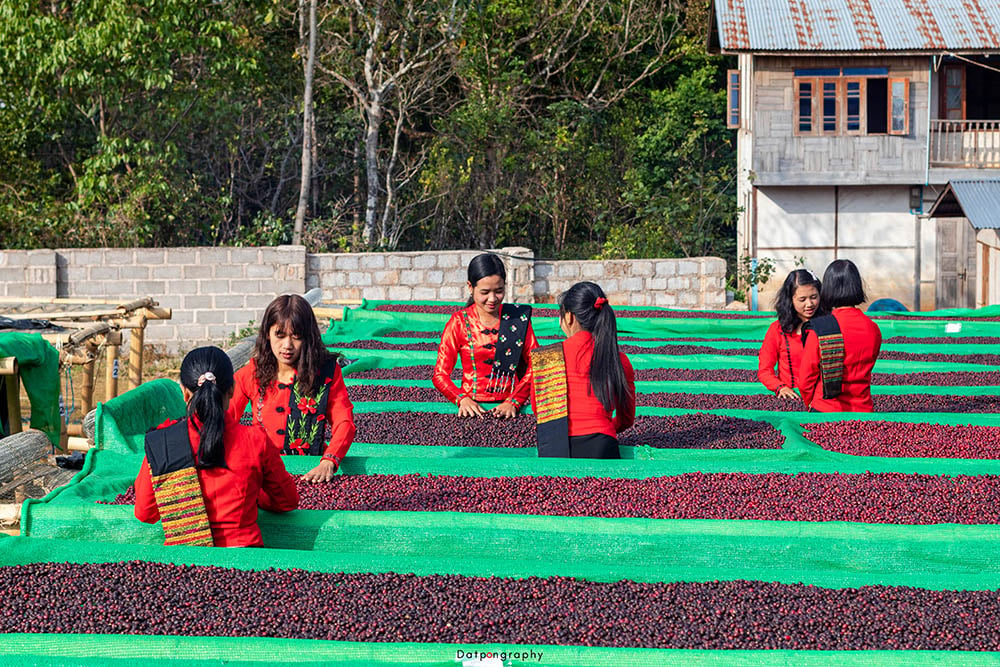
The association was formed in 2018 by 18 coffee communities around Ywangan Township.
Today, Shwe Taung Thu represents 300 producer members from 17 villages. Among these are 118 active smallholders who own the company and invest.
The Marketing and Quality Control Manager is 30-year-old Soe Thinzar (she is known as Moon as she was born during a full moon night).
After graduating in electric engineering, she started working in coffee, representing a young generation that sees potential in the sector.
Soe explains that community leaders decided to organise to sell their coffee to foreign buyers when the CQI project ended.
Shwe Taung Thu doesn’t have a dry mill, so they produce only Natural coffees, mostly Catuaís, and export through MCG.
She says that “the villages work as teams and coffee doesn’t belong to individual farmers. Some of them invest their own money in the company and get a bigger share of the profit".
The ones that don't invest get a smaller part of the profit on top of being paid for cherries and their work, sorting and drying coffee.
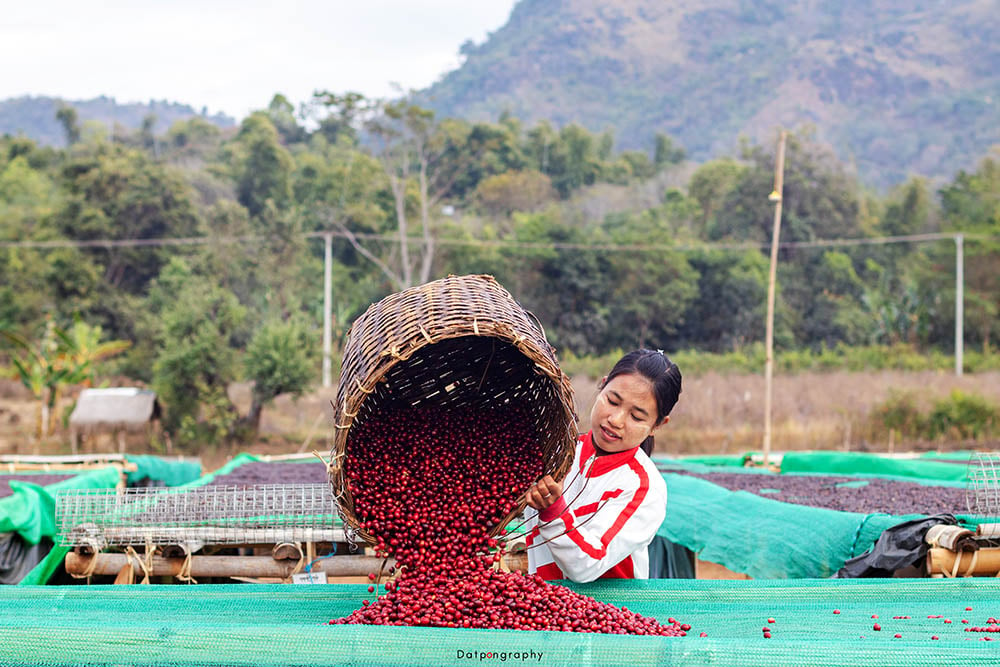
Supporting Women and Youth
The association covers a small area, so leaders can easily work together. Most villages are only a 15-minute drive from each other. Farmers come from two ethnic groups, the Danu people and the Pa-O people, and most of them are Buddhist women.
Working with women is a point of pride for Shwe Taung Thu, as they “use their income from coffee for their children’s education and food”. The group also employs young people from coffee families during harvest.
“Our coffee season is the off-season, so universities are closed. Some university students come to work in our operation. They use the money for their education,” Soe says.
Myanmar Harvest Update 2023
The harvest season started in November, a few weeks earlier than usual in Myanmar. In March, most coffees had already been picked and processing was progressing full steam ahead.
Some villages suffered from rain and hail in 2022, which affected their productivity. Yields in Myanmar are already low in general.
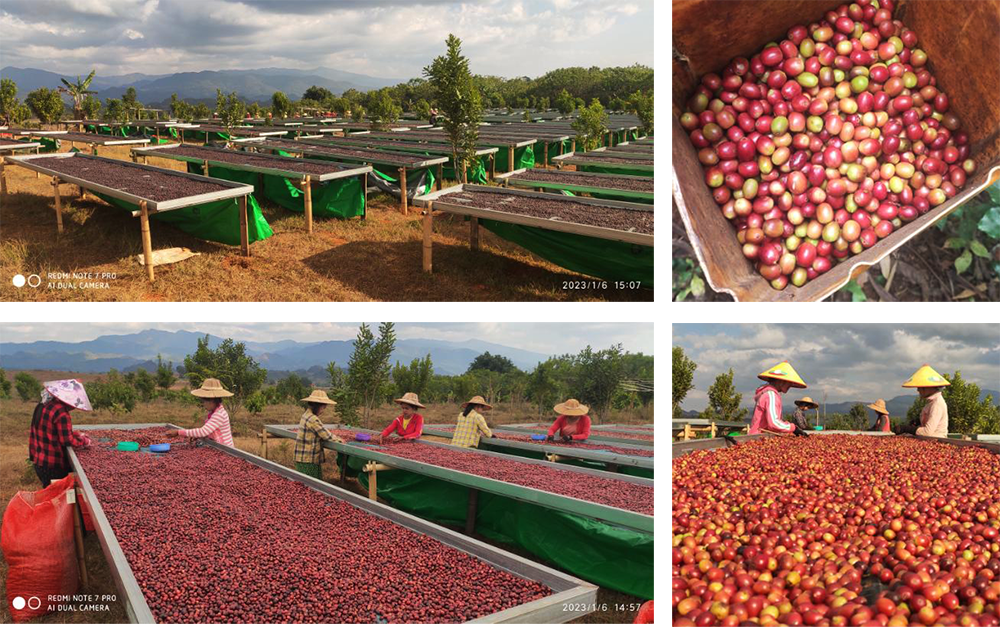
According to Marcelo Pereira, former Q Processing trainer in Myanmar, one of the reasons is J-rooting. When seedlings grow in shallow pots, lack of space restricts the development of the root system. J-rooted trees will always have a low output and need to be replaced.
April marks the New Year festivities in Myanmar. The Thingyan (translated as “of the Sun from Pisces to Aries”) celebrations last around a week, culminating in the New Year. That’s why producers usually start exporting coffee around May.
Cherry Inflation and Exchange Problems
MCG and Shwe Taung Thu report record cherry prices this season. According to U Sai Wan, the price went from 1,200 MMK to 3,700 MMK (US$0.57 to US$1.76) per viss in one year.
Post-coup economic sanctions clashed with pandemic inflation, raising costs of production and living in the country. Processors and associations are also struggling with competition from Thai buyers, who get better exchange rates and can offer more to farmers.
Currently, the government’s official exchange rate for Myanmar kyats is worse than the market rate. Myanmar sellers end up with fewer kyats for each dollar they receive.
“With this price, our FOB for a Washed coffee will be at US$3.35/lb. And US$4/lb for a Natural. This is the price range for coffee that scores 83 to 84 points. And it’s our break-even point,” stresses U Sai Wan.
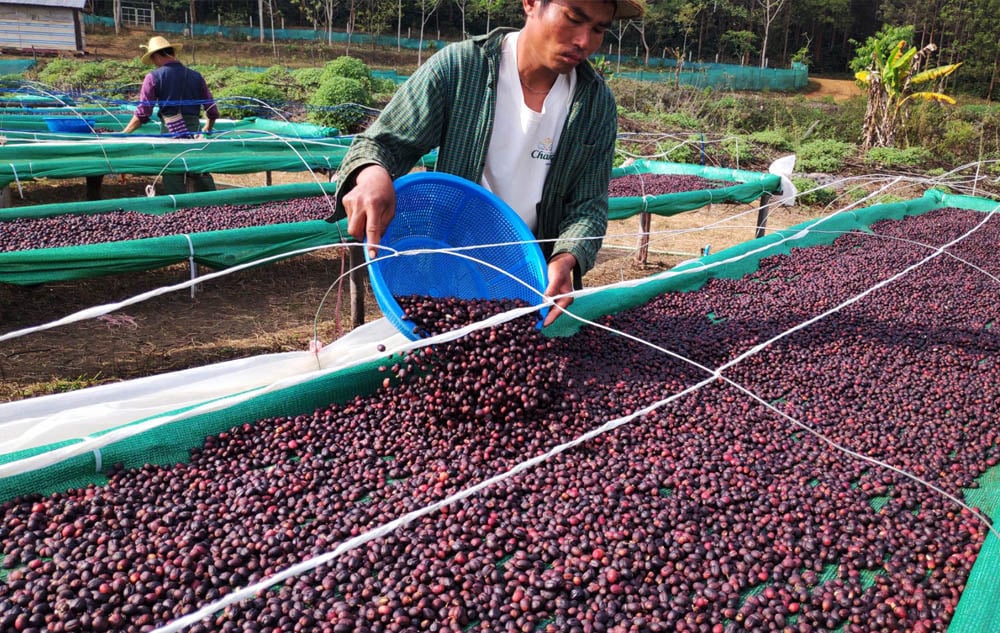
Encouraged by current prices, smallholders are planting more coffee in their backyards. In the meantime, processors try to balance cash flow and the financial difficulties of living under a military regime with having enough money to buy cherries for existing and new clients.
Myanmar Coffee on Algrano
|
Harvest
|
December to March
|
|
Order period
|
Mid-March and April
|
|
Shipment
|
May to September
|
|
Warehouse release
|
From October
|

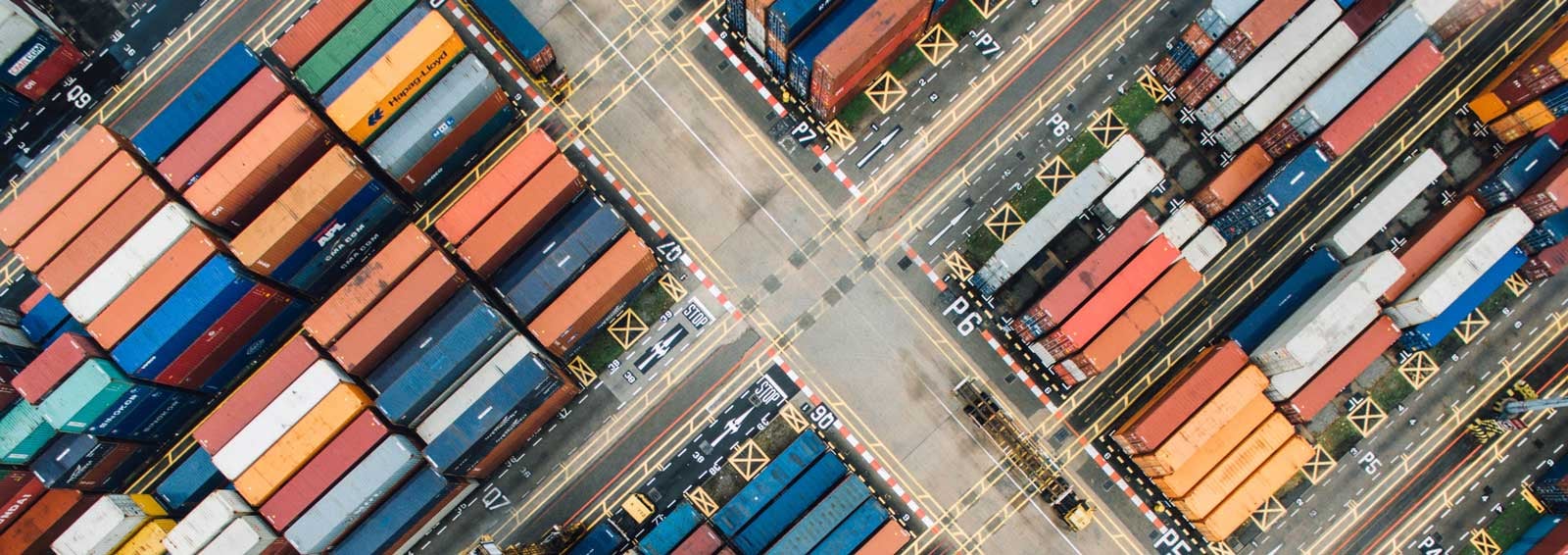
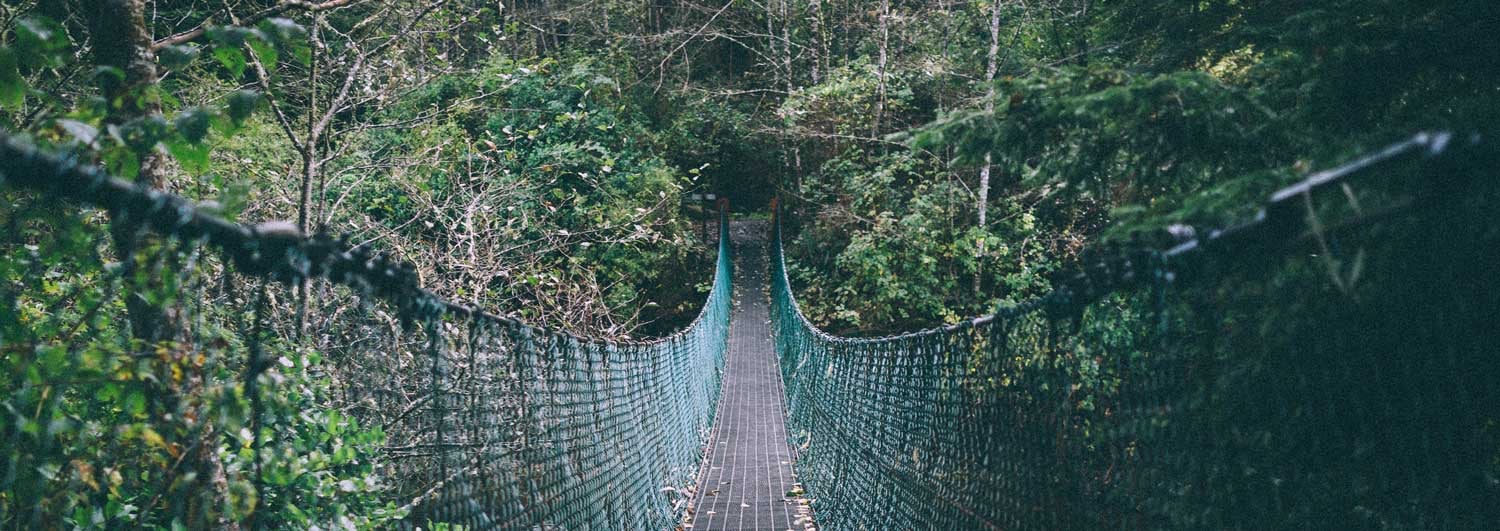

Let Us Know What You Thought about this Post.
Put your Comment Below.